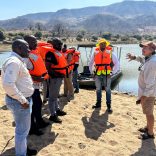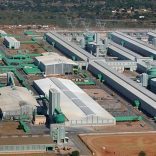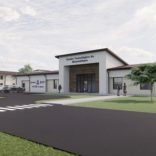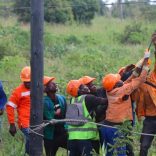Mozambique: AfDB delegation visits Mphanda Nkuwa hydro project
Gas is central to the energy transition in Mozambique – Nyusi

Photo: Noticias
Natural gas is a crucial element for the energy transition in Mozambique and for the transformation of the country’s economy and people’s lives, President Filipe Nyusi said yesterday in Accra, Ghana.
The head of state was speaking at the annual meeting of the African Development Bank (AfDB), where he participated in a panel discussing development opportunities on the African continent, in a context marked by various challenges.
Nyusi made clear the country’s position in relation to the exploitation of natural gas from the Rovuma Basin in response to a question posed by the panel moderator about Mozambique’s position on the subject at a time when developed countries were urging the abandoning of fossil fuels such as coal, given their impact on climate change.
“Gas is part of Mozambique’s energy package. I think the world should give us the opportunity to develop it, using the resources available to us. Our position is simply this,” Nyusi said.
According to the president, given the challenges facing the country, there are expectations that gas will be a catalyst for economic development and an opportunity to finance both the energy transition and the diversification of energy sources, using its revenues to leverage other sectors of the economy such as tourism and agriculture.
He said that the countries urging the abandonment of resources such as coal are, for the most part, Westerners who in the past used it to leverage their economies, and said he thought it fair that the African continent be also given the opportunity to develop.
“The ones that contribute the most to emissions are the developed countries, and we are victims of the impacts of climate change. As you may know, Mozambique is a victim of cyclones, as was the case with Idai, which destroyed my country,” he recalled.
At the same meeting, AfDB president Akinwumi Adesina advocated a just energy transition, in which gas would form part of the transition package. He announced that the AfDB would mobilise US$100 billion to finance the transition and mitigate the effects of climate change on the continent.
The head of the AfDB also announced the mobilisation of US$1.5 billion to cover losses caused by extreme weather events, especially in the agricultural sector, guaranteeing the production of food for the populations.
Another panel member, President Nana Akufo Addo of Ghana, challenged the AfDB to assume a more interventionist role in the revitalization of economic development in Africa, intervening vigorously in low-income economies, increasingly suffocated by the crisis in Ukraine, Covid-19 and other evils.












Leave a Reply
Be the First to Comment!
You must be logged in to post a comment.
You must be logged in to post a comment.